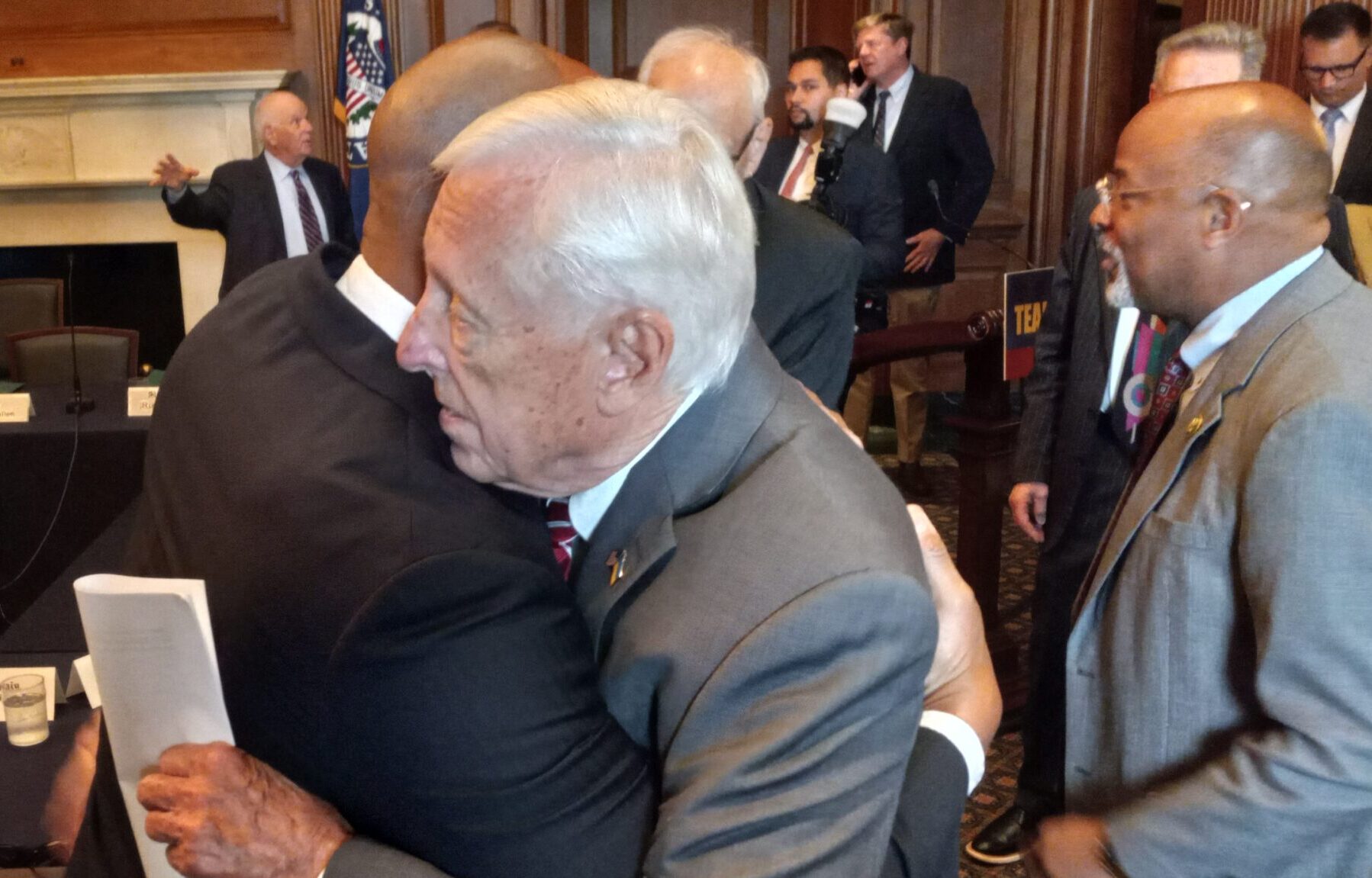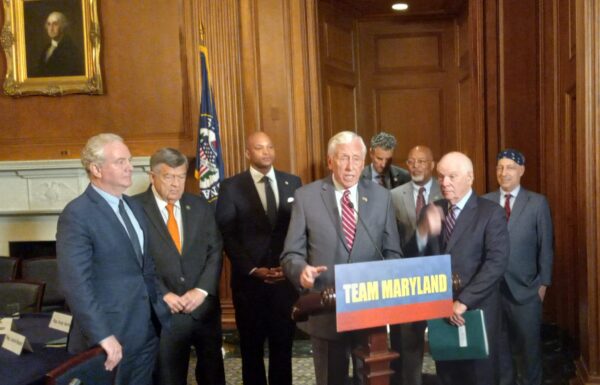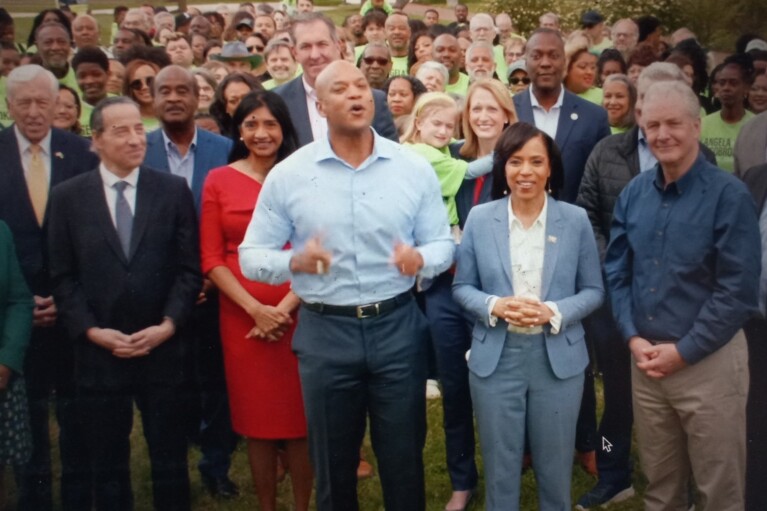Moore and the Md. congressional delegation in full harmony at their initial Capitol Hill meeting

Sometimes, the relationship between a Maryland governor and the state’s congressional delegation can be summed up by sheer math.
When Republican Larry Hogan was governor, he served alongside a congressional delegation that featured nine Democrats — and the lone Republican, U.S. Rep. Andy Harris (1st) and Hogan didn’t get along all that well. So Hogan and the delegation did the things they were required to do and worked together on a regular basis, but they weren’t necessarily invested in one another’s enduring success.
Now that Democrat Wes Moore is governor, there seems to be the potential for a much stronger relationship — a fact that was abundantly clear Monday afternoon as the delegation played host to Moore and key members of his administration during a 2-hour meeting in the U.S. Capitol.
The mutual praise flowed freely and was almost hyperbolic. At least half a dozen times, Moore said Maryland has the best congressional delegation in the land.
“I will put this delegation against anyone in the country — period and full stop,” the governor said. He later called Maryland’s lawmakers “incredibly hard-charging.”
The eight Democrats who attended the meeting — only Rep. David Trone (D-6th) was absent — returned the admiration.
“Thank you for the close cooperation that we’ve had,” said Sen. Ben Cardin (D), who as Maryland’s senior U.S. senator is considered the head of the state’s congressional delegation. “We talk about Team Maryland and unity. By working together, we’re able to get more done for the state of Maryland.”
Although the meeting in the Mansfield Room, named for a long-serving and long-departed former Senate Democratic leader from Montana, was a public event designed to generate publicity about the delegation’s desire to work with the new administration and vice-versa, the conversation often moved beyond the level of talking points and platitudes, thanks in part to the presence of seven of Moore’s cabinet secretaries, who supplied some of the prose to augment the governor’s poetry.
“We have pros in these seats. We have experts in these seats,” Moore said of his colleagues.
Some of the shared priorities among state leaders are obvious: Protecting the Chesapeake Bay. Attracting the new FBI headquarters to Prince George’s County. Curbing gun violence. And funding, funding, funding, particularly for priority transportation projects like the proposal to restart the Red Line transit line in the Baltimore region that Hogan killed in 2015.
Moore said his broad ask of the lawmakers was threefold: “transportation, regulation and identification.” An improved transportation system, he said, including a newer version of the Red Line, would be an economic boon to the state and its residents.
“These are the investments that are going to create jobs,” he said. “These are the investments that are going to grow the economy.”
On the regulatory front, Moore said he would rely on the state’s senators and representatives to clear the way for important Maryland projects with the Biden administration, using the state’s desire to quadruple its capacity for offshore wind energy off the coast of Ocean City as an example. U.S. Sen. Chris Van Hollen (D) said he had been at an event with Interior Secretary Deb Haaland earlier this month and had made a pitch for Maryland’s offshore wind potential.
And for the identification part of Moore’s wish list, he said he was counting on the delegation to explore and pinpoint every available federal dollar.
“We’re going to be eligible for a whole lot of federal funds over the next decade,” he said. “We don’t want Maryland to get its fair share. We want Maryland to get more than its fair share. And I’m unapologetic about saying that.”
Though this was the first formal public meeting between Moore and the full congressional delegation, all of the principals emphasized that the conversations and strategy sessions have been ongoing since Moore took office in in mid January. And Monday’s meeting in a sense was a status update, with Moore and his cabinet officials re-emphasizing some of their top policy prescriptions, and members of the delegation offering updates on federal legislation or conversations they’ve had with key members of the Biden administration.

Gov. Wes Moore (D) and most of the state’s congressional delegation meet the press after their Capitol Hill meeting Monday. Photo by Josh Kurtz.
Some of the less high-profile topics that were discussed included mental and behavioral health funding for children and teens, the Water Resources Development Act and its impact on drinking water, affordable housing, the proposed Chesapeake National Recreation Area, military aircraft at Martin State Airport, the theft of SNAP program food benefits, invasive Blue Catfish in the Chesapeake Bay, and more. Cardin warned that with the new deal to increase the U.S. debt ceiling, federal funding will get tighter.
“We’re very happy we didn’t go off the cliff,” he said. “But we have to face reality that budgets are essentially going to be frozen.”
The mass shooting in Annapolis on Sunday night was also top of mind for many of the officials present. Three people were killed and three others wounded after what police described as a dispute between neighbors over parking that boiled over during a party at a private home.
“Last night I got the phone call that every chief executive dreads getting,” Moore said. He and several congressional members decried gun violence and said the federal government needs to do more to stop it. But they conceded that comprehensive action would be difficult in the current political climate.
As the lone Republican at the meeting — and a member of the far-right Freedom Caucus — Harris sat in respectful silence as his colleagues and Moore took stances that he has publicly opposed, including cracking down on the availability of guns for purchase and expanding offshore wind energy. But as a practicing anesthesiologist and as chair of the House Appropriations Subcommittee on Agriculture, Rural Development, Food and Drug Administration, Harris said he hoped the Moore administration would support a measure he has introduced to require nutrition guidelines for food stamp purchased and also encouraged Maryland to consider entering a pilot program that he aims to create.
“We know that non-nutritious food and beverages contribute to our problems,” like obesity, he said. “These are expensive diseases to treat.”
“We’re very interested in sitting down and speaking with you about this,” Moore replied.
Harris skipped the post-meeting news conference, which essentially became a recitation of everything Moore and the lawmakers had previously said.
As the news conference was winding down, Rep. Kweisi Mfume (D), crediting the late Maryland Sen. Paul Sarbanes (D) for the line, observed: “Everything that can be said, has been said. It’s just not everyone has said it.”




 Creative Commons Attribution
Creative Commons Attribution